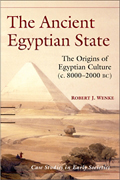
The ancient egyptian state: the origins of egyptian culture (c. 8000-2000 BC)
Wenke, Robert J.
This book focuses on the development of Egypt in its formative phase, from ca. 5200 BC, when Egyptians first began farming wheat and barley, until 2160 BC,as Egypt's central government weakened and appears to have fallen into disorder. During these millennia, which coincide with the Predynastic, Early Dynastic, and Old Kingdom periods, Egyptian civilization became increasingly complex,and many of its greatest pyramids and other monuments were built. Robert Wenke examines this cycle of ancient Egypt's development by analyzing Egyptological, anthropological, and other forms of evidence, which are set into the largercontext of early civilizations that developed in various areas of the world. Written in an accessible style, with many anecdotes, quotations, and personal reflections, this book is intended for use in undergraduate and graduate courses on early civilizations and states. INDICE: 1. The significance and interpretation of Ancient Egyptian civilization; 2. Introduction to the Ancient Egyptians and their country; 3. Introduction to the evidence and interpretation of Egyptian antiquity; 4. The neolithic and early predynastic origins of pharaonic civilization; 5. Lords of the twolands - the origins of the first pharaonic states; 6. The pharaonic state in early maturity; 7. Egypt and general analyses of state origins.
- ISBN: 978-0-521-57487-7
- Editorial: Cambridge University
- Encuadernacion: Rústica
- Páginas: 395
- Fecha Publicación: 24/04/2009
- Nº Volúmenes: 1
- Idioma: Inglés
